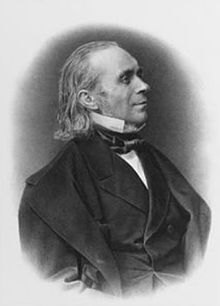Louis-Antoine Garnier-Pagès
Louis-Antoine Garnier-Pagès (born February 16, 1803 in Marseille , † October 31, 1878 in Paris ) was a member of the French provisional government from 1848.
Louis Antoine Garnier-Pagès, half-brother of Étienne Joseph Louis Garnier-Pagès , was a trading broker in Paris at the outbreak of the July Revolution, managed the construction of barricades in the St.-Avoye district, but then devoted himself entirely to trading until his brother's death in 1841 prompted him to enter the political career.
Elected to the Chamber of Deputies, he joined the extreme left. But he was less involved in questions of political principle than in business and financial questions. It was not until the reform agitation in 1847 that he appeared as one of the most active leaders of the left. After the February Revolution of 1848 he was appointed Mayor of Paris and a member of the Provisional Government and began his effectiveness with the fact that he was the so-called. Proclaimed workers' right to work.
Appointed Minister of Finance on March 5 , he obtained a loan of 230 million francs from the Bank of France in return for the pledge of state forests, by making the bank notes compulsory, and also postponing the redemption of the treasury bills, which made up almost two thirds of the pending debt the remainder of these, savings bank deposits of 350 million, for the needs of the state, by allowing repayments only to the amount of 100 francs and issuing treasury bills or pension certificates for the rest, increased direct taxes by 45 percent and avoided them through these and similar, admittedly highly unpopular measures, at least the impending financial crisis.
Shortly afterwards he was elected to the Executive Committee, which took the place of the Provisional Government, but was ousted after just six weeks by the dictatorship of Louis Eugène Cavaignac . From then on again a simple MP, he voted with the more moderate section of the Democratic Party, but even now took part almost only in the discussion of financial questions.
No longer elected to the Legislative Assembly, he withdrew into private life and devoted himself partly to industrial enterprises and partly to the writing of the detailed Histoire de la révolution de 1848 .
In March 1864 he was re-elected to the legislature by a Paris constituency, where he joined the small but feared opposition party. After the fall of the Empire in September 1870, G. became a member of the provisional government, but had only a small share in its actions. In the elections on February 8th, he was not elected to the National Assembly and because of his poor health he settled in Cannes. He supplemented his great work on the February Revolution with the Histoire de la Commission exécutive (1869–72, 2 volumes) and L'Opposition et l'Empire (1873, 2 volumes).
Individual evidence
- ↑ Histoire de la révolution de 1848 . 8 volumes, Paris 1861–1862; 2nd Edition. 1866.
| personal data | |
|---|---|
| SURNAME | Garnier-Pagès, Louis-Antoine |
| BRIEF DESCRIPTION | French politician |
| DATE OF BIRTH | February 16, 1803 |
| PLACE OF BIRTH | Marseille |
| DATE OF DEATH | October 31, 1878 |
| Place of death | Paris |
